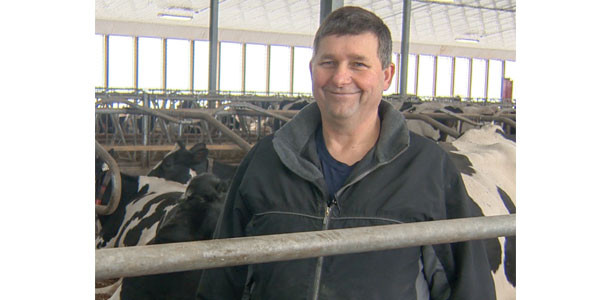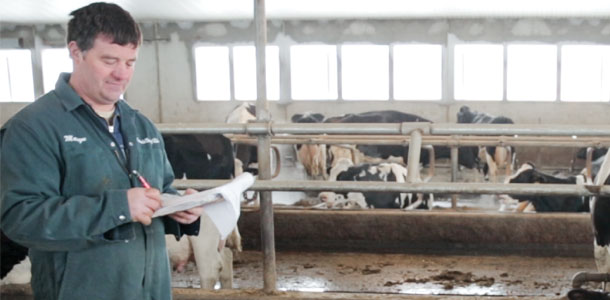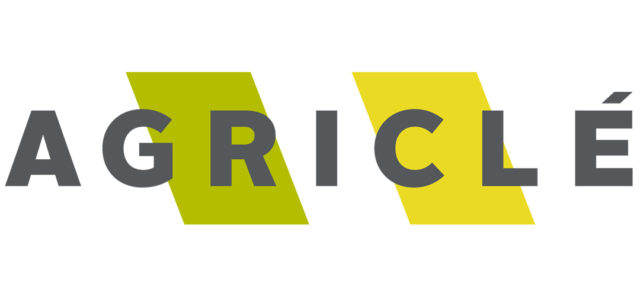The money spent on locally made high-quality milk or delicious cheese stays right here in Canada, benefitting farmers, businesses, taxpayers and all hard-working Canadians. When Canadian dairy products are purchased, immediate benefits trickle down to all Canadians. We call it the Milkle-Down Effect.
John Vissers, a second-generation dairy farmer in Stewiacke, Nova Scotia, sees these benefits every day. “The dairy industry creates jobs and spin-off jobs,” he says. “We are a rural industry, but we are spread out across the land so it creates jobs in areas where otherwise there would be no activity. It’s a lifeline for other industries in Nova Scotia.”
Vissers, who operates Winding River Farms with his brother-in-law and both of their sons, understands the importance of investing in his community. “We like that consumers buy local. We have to support local [businesses] too. For example, the lumber used in our barn comes from the local sawmill.”
“With Canada engaged in international free-trade discussions, it is important for Canadians to understand the value of Canada’s dairy industry and what it contributes economically and socially,” says Wally Smith, president of the Dairy Farmers of Canada (DFC).
 Canadian dairy farmers are committed to keeping Canadian dairy local. That means that every dollar spent is re-invested by dairy farmers in their local communities. In 2013:
Canadian dairy farmers are committed to keeping Canadian dairy local. That means that every dollar spent is re-invested by dairy farmers in their local communities. In 2013:
- The sector’s contribution to Canada’s GDP is $18.9 billion.
- Canadian dairy farms and processors add $10.8 billion to the Canadian economy.
- Total tax revenue generated from dairy activity adds up to $3.6 billion.
- The industry sustains 215,000 Canadian jobs (direct, indirect and induced), meaning one in 100 Canadian jobs are linked to dairy.
- The Canadian dairy industry is an engine of local economies. For example, in some regions of Ontario, the dairy industry supports up to four in 10 jobs and in central Nova Scotia, 16 percent of jobs are linked to the dairy sector.
The Canadian dairy sector is a mainstay of the economy. In agriculture, the dairy sector is first or second in economic importance in seven provinces.
Milk for growth and confidence
DFC recently released the third study of a series titled “The Economic Impacts of the Dairy Industry in 2013,” which highlights the growth, impact and importance of the dairy industry. Our growth since 2009 speaks eloquently. From 2009 to 2013, we delivered:
- +15.7 percent growth in GDP contributions
- +10.5 percent in tax revenues for the three levels of government
On the job side, the number of full-time equivalent jobs has decreased on farms as new technology has made farms more efficient and offer a better life-work balance for farm families.
A noticeable shift to value-added segments has been observed, however, with 10 more processing units than in 2009 and an increase in the number of indirect and induced jobs.
“We employ a large workforce outside of the farm,” says Jake Vermeer, a second-generation farmer in Alberta. “We have weekly visits from veterinarians and monthly visits from nutritionists. We drive a lot of economic success from having a dairy farm in our community.”
 Indeed, experts in animal health, nutrition and comfort provide goods and services that allow our family farms to meet the highest standards in the world and maintain consumer confidence in Canadian milk and dairy products.
Indeed, experts in animal health, nutrition and comfort provide goods and services that allow our family farms to meet the highest standards in the world and maintain consumer confidence in Canadian milk and dairy products.
While the Milkle-Down Effect has big economic consequences, its effects can also be seen in every community, every day, in many important ways.
Dairy farmers invest in research and development in agricultural science in our local universities and colleges. These investments help produce better milk and healthier cows, train the next generation of agricultural scientists and fuel a billion-dollar business for cow genetics.
Farmers are leaders in their communities, investing time and resources into regional development. They also sponsor local sports teams; are coaches, teachers and fund-raisers for community projects.
A system of support
Supply management is a non-subsidized system that helps provide stability, not only to the agricultural sector but also to the Canadian economy as a whole.
Quebec farmer Frédéric Marcoux says that without supply management, farms would be isolated with little community engagement. “There are many farms and families in our community and because we know everyone, we support and encourage local businesses,” he says. “We work with numerous producers in our town and the surrounding ones.”
 Our system also guarantees quality, has strict animal safety guidelines and is committed to protecting the environment.
Our system also guarantees quality, has strict animal safety guidelines and is committed to protecting the environment.
For farmers like John Vissers, supporting local industries and economies through his dairy farm is a way of life; one that he plans on doing for many years to come.
For more information:
- Visit: Our Milkle-Down Effect website
- Read: “The Economic Impacts of the Dairy Industry in 2013” study. PD
—Article and images provided by Dairy Farmers of Canada
PHOTO 1: John Vissers, a dairyman from Nova Scotia, says Canada’s dairy industry is good for rural economies.
PHOTOS 2 & 3: Second-generation Alberta farmer Jake Vermeer, middle, drives economic success in his community by paying service providers, like nutritionists and veterinarians.










